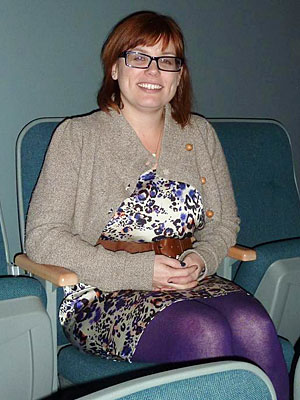
Stephanie Walker lost a home to foreclosure, but in the aftermath, she found her voice. She has blogged about it and put out an e-book about it. And on Sunday, a group of actors at Victory Gardens Theater performed a staged reading of American Home, her play about it.
The play, which won a Blue Ink Award earlier this year from American Blues Theater, intertwines the personal stories behind three home foreclosures. At the same time, it looks at the larger causes and effects of the wave of foreclosures that has swept the country.
“There doesn’t seem anywhere one can go to nest without being owned by her nest,” says one character late in the play. She’s echoing a sentiment that is quite common now, not only among the foreclosed but also among the many people whose underwater mortgages are hampering their ability to move to a new house or to spend money. On Tuesday, Zillow reported that Chicago-area home values in October were down 10.4 percent from a year before, more than twice the national average. The more prices drop, the more people feel owned by their nests.
In American Home, a young couple buys a Los Angeles dream house they can just barely afford, then lose their income stream and ultimately their house. An older woman unwittingly drains all the equity out of the home she and her late husband moved into decades before the home-value boom. And a preacher who helps her moderate-income congregants take out unsupportable mortgages sees them collapse under the debt. Also tossed into the mix are a publicity-hungry woman who chains herself to the home she can no longer afford and a pair of news anchors who function as a Greek chorus, praising, probing, and ridiculing various people caught up in foreclosure.
While none of the homeowners comes out looking like a hero, it’s worth noting that the character whose tale is closest to Walker’s own is the one she depicts as the most self-indulgent and prone to denial and budgetary cluelessness. In other words, it’s not a lament about having been victimized. Walker is clear-eyed about the foreclosure she and her husband, Bob, went through. In September, she blogged that being candid about their past helped the couple land an apartment back here in her native Chicago when their credit was shot.
Sunday’s staged reading was part of the development process that American Blues is putting Walker’s script through. Eight actors read the script for an audience of about 30 (they borrowed the auditorium from a production of It’s a Wonderful Life, another tale that revolves around a financial crisis). Afterward, Walker took notes on what members of the audience thought could be strengthened. American Blues may go on to produce a full-fledged production, but if not, Walker wants to pursue getting her play produced by another company.
One person in Sunday’s audience brought up an intriguing point about Walker’s timing: Not only does her play end before you see clearly how postforeclosure life turns out, but the play itself appears while the country is in the midst of its own unresolved housing dilemma. Earlier this month, a Bank of America analyst noted that six million U.S. homes have undergone foreclosure since 2007, and she forecast that as many as eight million more may go through the process in the next four years. What’s more, said the analyst, 2013 may turn out to be the worst year yet in foreclosures. So even though Walker has completed a two-act script, we may be a long way from the end of the real-life drama.


